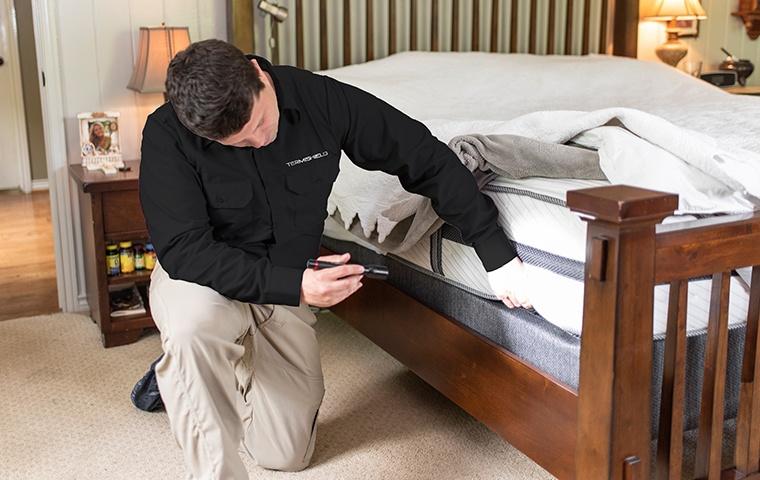Kings Cincinnati Bug Control Companies: Reliable Services
Kings Cincinnati Bug Control Companies: Reliable Services
Blog Article
Kinds of Parasite Control: Which Approach Is Right for Your Problem?
When encountered with a bug infestation, the choice of a suitable approach for insect control is critical in efficiently taking care of the circumstance. By discovering the various types of parasite control methods available, individuals can make enlightened decisions tailored to their one-of-a-kind situations, making certain a more reliable and sustainable result in parasite eradication.
Chemical Insect Control
Chemical parasite control involves making use of artificial or normally acquired chemicals to manage and eliminate pest populaces properly. This method is typically used in farming, forestry, and household settings to fight a large range of parasites, including insects, rodents, and weeds. Using chemical pesticides can offer quick and targeted services to pest invasions, making it a prominent option for several people and organizations.
Among the vital benefits of chemical parasite control is its capacity to promptly remove bugs, lowering the threat of damages to crops, residential or commercial property, and human health. By utilizing particular chemicals that target particular pests, this method can effectively regulate problems while decreasing injury to helpful microorganisms and the atmosphere when applied correctly.
Nonetheless, making use of chemical bug control likewise increases issues regarding prospective negative impacts on non-target species, water sources, and human health. It is critical to adhere to safety and security standards, apply chemicals properly, and consider alternative parasite control approaches to reduce these threats and guarantee sustainable insect administration methods.
Biological Insect Control
Biological parasite control, likewise known as biocontrol, makes use of living organisms to manage and lower bug populations normally. This method takes advantage of the power of nature to control parasites without the requirement for artificial chemicals. Biocontrol can include the intro of natural adversaries of the pest varieties, such as predators, virus, or parasites, to reduce parasite populations. By using the bug's all-natural predators or virus, biological insect control supplies a ecologically friendly and sustainable remedy to pest management.

Mechanical Pest Control
Making use of hands-on and physical methods to take care of insect populations, mechanical bug control provides an alternative strategy that does not rely upon using living microorganisms or synthetic chemicals. This approach includes using obstacles, traps, or various other devices to literally discourage or remove bugs. By blocking bug entry factors or setting up catches to capture them, mechanical insect control can effectively minimize infestations without presenting chemicals into the atmosphere.
One usual example of mechanical parasite control is the use of mesh displays on doors and windows to avoid bugs from getting in buildings. This basic yet effective technique acts as a physical barrier, maintaining pests out while enabling proper ventilation. In addition, devices like mousetraps, fly swatters, and ultrasonic repellents fall under the mechanical parasite control category.
While mechanical bug control approaches can be labor-intensive and require routine monitoring and maintenance, they use a environmentally pleasant and lasting solution for managing bug infestations. redirected here By integrating various mechanical strategies, residential or commercial property proprietors can develop a comprehensive insect control technique that decreases reliance on chemical pesticides.
Physical Bug Control

Some common physical parasite control techniques consist of making use of barriers such as displays or nets to protect against bug entry, catches to capture and eliminate pests, and hand-picking to literally remove parasites from plants or structures. In addition, methods like warmth treatments can be used to manage parasites like bed insects by elevating the temperature to degrees that are lethal to the bugs.
Physical pest control is especially useful in integrated parasite management (IPM) approaches, where multiple bug control approaches are integrated for reliable pest administration while decreasing making use of chemicals. By using physical More Info parasite control techniques, individuals can properly address insect problems with marginal environmental effect.
Integrated Bug Monitoring
When executing physical bug control approaches as component of pest management methods, Integrated Parasite Monitoring (IPM) emerges as an extensive method that leverages numerous strategies to effectively control pest populations. IPM concentrates on long-lasting prevention of bugs via a mix of organic, social, physical, and chemical tools tailored to particular parasite concerns. By incorporating numerous control methods, IPM intends to minimize the risks associated with pests while also decreasing reliance on chemical solutions.
One secret element of IPM is the emphasis on tracking and evaluating pest populations to determine the most appropriate control approaches. This aggressive strategy permits very early intervention and targeted techniques, resulting in much more efficient parasite monitoring. Furthermore, IPM promotes ecologically friendly techniques by focusing on non-chemical control techniques and just making use of chemicals as a click this link last resource.
Final Thought

By utilizing the insect's natural predators or microorganisms, biological insect control provides a sustainable and environmentally friendly solution to pest management. - Kings cincinnati pest control companies
Making use of physical and hand-operated approaches to handle bug populations, mechanical insect control offers an alternative approach that does not count on the usage of living organisms or synthetic chemicals.An effective strategy to taking care of bug populaces without relying on chemical or organic approaches includes the usage of physical pest control methods.When carrying out physical insect control methods as component of parasite management strategies, Integrated Parasite Administration (IPM) emerges as a comprehensive technique that leverages various strategies to successfully control pest populaces. Chemical insect control entails the usage of pesticides, organic pest control makes use of natural killers, mechanical pest control entails physical barriers, physical parasite control includes capturing or removing bugs, and integrated bug management incorporates multiple techniques for a holistic technique to pest control.
Report this page